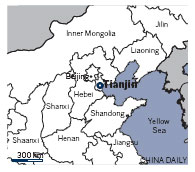
|
Tianjin is one of China's most famous coastal cities and its port facility is one of the largest in the world. Xia Yu / for China Daily |

A 30-minute high-speed train trip from the capital makes Tianjin a convenient gateway, Liu Lu discovers.
Tianjin literally means "heavenly ford" in Chinese and was named in 1404 during Yongle's reign of the Ming Dynasty (1368-1644) when it became a garrison town and the port of emperors.
With its abundance of historical relics and cultural gems, fantastic scenery, as well as renowned snacks, Tianjin ranks as one of the top tourist destinations in North China.
Today, the city has developed into one of China's largest industrial bases and regional trade centers.
A beautiful coastal city, Tianjin has all the conveniences of a big city with the relaxing and romantic atmosphere of a smaller town.
The city is also a port of call for many international cruises.
Its close proximity to Beijing, and the new high-speed train service from the nation's capital, which only takes 30 minutes, also makes it top choice for Beijingers planning a weekend excursion.
The following five locations are the top choices on any Tianjin travel itinerary:

Ancient Culture Street
The Ancient Cultural Street is a must-see on a Tianjin tour.
Located in the downtown area, the street is essentially a business street. However, the splendid architecture and classic cultural features have earned it the reputation as a top sightseeing spot.
At the center of the street stands Tianhou Palace, one of the only three Mazu Temples in the world. Originally built in 1326, the temple provides visitors with a bird's-eye view of the whole street.
The street is also a perfect choice for visitors interested in Chinese traditional handicrafts and local snacks.
Hundreds of shops and stores are housed along the street in special buildings, which feature blue bricks and colorful paintings on doors and windows.
Five Avenue Area
A tour of the Five Avenue Area in a horse-drawn carriage is the best way to enjoy Tianjin's unique colonial cityscape.
Renowned as "World Building Exposition", the area is shaped in a giant rectangle and features more than 2,000 garden-styled villas built in different European architectural styles.
During the 1920s and 1930s, when Tianjin was a busy international port, merchants from many different countries constructed these beautiful buildings.
The occupants of these buildings have included two presidents of China and seven premiers or acting prime ministers.
Haihe River
Considered the mother river of the city, Haihe River is formed by the convergence of five rivers and was once a busy trading center.
The locals say it is a waterway endowed with the strength of the sea and the tenderness of a river. Nowadays the attractions along the riverbanks make it a popular holiday destination.
Haihe Park is an ideal place for rest and recreation and looks like a jade belt attached to the riverbank. Sightseeing ships and speedboats in the Haihe Fountain Amusement Park offer visitors tours along the river. People can also enjoy the river at night by taking a boat excursion.
Mount Panshan
Known as one of the top 15 mountains of China, Panshan Mountain is located on the outskirts of Tianjin. It is covered with lavish vegetation and has a rich historical heritage.
The mountain is famous for its jade pines, breathtaking peak views, clear waters, strangely shaped rocks and clusters of ancient temples. More than 320 kinds of trees and shrubs can be found in the area making the mountain a natural botanical garden.
The mountain has become a great escape for the city dwellers of Beijing and Tianjin.
Nanshi Food and Hotel Street
Visitors can indulge in almost all types of Chinese dishes on Nanshi Food and Hotel Street. One can taste seven of the eight classical Chinese cuisines here.
The street is an ancient building complex accommodating more than 100 restaurants.
While the wide range of dishes may seduce your appetite, the traditional architecture and decorations also offer a visual feast.
The neighboring hotel street is lined with a cluster of buildings modeled on the architectural style of the Qing Dynasty (1644-1911), ensuring a pleasant stay after you gastronomic adventures.
(China Daily 05/19/2011)